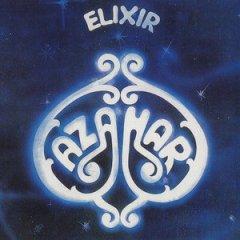Azahar - Elixir (1977)
Azahar - Elixir (1977)

1. Campos de Azahar (3:59) 2. ?Que malo hay Señor Juez? (4:38) 3. !Es que esto no tiene nombre! (5:50) 4. Mercaderes (4:39) 5. Un hombre cansado (3:44) 6. Cantaros de fuego (3:32) 7. Viaje a Marruecos (11:26) 1) Flipados 2) Que no me vean 3) Colgados de la rama gorda - Dick Zappala - vocals, keyboards, percussion - Antonio Valls - mandolin, electric guitar, acoustic guitar, Spanish guitar - Gusatovo Ros - synthesizer, mellotron, Fender Rhodes, piano - Jorge Barral - bass, percussion, acoustic guitar, Spanish guitar
What a peculiar band were Azahar! They created a rough sound, an energetic combination of ethereal keyboard orchestrations and guitar riffs, the bassist made his instrument assume a prominent position, the guitar solos were quite rocky, and the occasional synth solos and harmonies served as an appropriate match, and last but not least, Zappala's passionate singing added some more fire to the band's musical flame during his interventions. and yet, they had no drummer. The fact is that the band were searching for a compatible and interested drummer while they were starting to create and arrange their own repertoire, and somewhere on the road they decided that the band worked well without a drummer. Given the fact that the band's material is heavily influenced by Flamenco and Arabic folklores, which are indeed very rhythmic musical sources, it is odd that Azahar could feel at ease without a drummer/percussionist. But they certainly did, and made it work alright. The lack of a drummer allowed all four musicians (lead vocalist Zappala plays some string synthesizer, too, while bass player Barral is in charge of the percussions) to expand their performances without the constraints of well-marked rhythm patterns: the tempo itself is created and/or kept and/or modified by the interaction between Valls, Zappala, Ros and Barral. Anyways, it is clear that pace is not the most relevant concern for the band - texture and cadence are. Regarding this factor, it is fair to make a special mention for Barral's melodic approach to his bass parts: he manages to participate in the band's overall freedom, while making his instrument function as some sort of basis for all nine tracks. The instrumentals feel quite soaring, as if the sounds were floating in the air while the sun sets on the edge of some Andalusian coast - the opener 'Campos de Azahar' is an eerie exotic gem, and so are the melancholic 'Mercaderes' and the joyful 'Cántaros de Fuego', while '¡Es que Esto No Tiene Nombre!' portrays a more symphonic drive. The latter is one of the finest pieces in the album, complex and full of twists, yet none of these twists feels forced or gratuitous: each and every shift of pace is cleverly placed as a connection between one preceding section and the following one. The sung tracks may be the hardest to take for the listener, since Zappala's style and timber are acquired tastes. It would be reasonable that some might find it annoying, but I personally enjoy his vocal excursions, which are based on an over-exaggeration of Flamenco singing (which is an exaggerated singing style per se): I notice a disposition for humour and a crude, unabashed sense of drama in his singing. Those can be certainly felt in his pro- marijuana claim for '¿Qué Malo Hay, Señor Juez?' and his existentialist concerns for 'Un Hombre Cansado'. His singing becomes a bit more relaxed and focused in the closing three-section suite 'Viaje a Marruecos', which finds the band exploring diverse motifs, harmonies and textures for an 11+ minute time. The exotic element is enhanced here in a most fascinating manner. The culminating climax closes down the album with full passion: Valls seems to have kept his best soloing for this moment, while the keyboard layers expand themselves in order to create an atmosphere of elation. A great ending for a record that would make an excellent addition to any good prog collection. ---Cesar Inca, progarchives.com
Tras un gran diseño de portada, con carpeta abierta, se encuentra indiscutiblemente uno de los pesos pesados del progresivo nacional. El álbum Elixir, es impactante; con una variedad de recursos apabullantes para un álbum de rock, aquí no se utiliza batería, y los temas fluyen igual de frescos, con una excelente construcción, destilando olor a azahar por todos los lados y surcos –a parte del encarte claro, que ya sabéis que se acercaba la nariz, y olía a azahar–. La carismática voz de Zappala, los manotazos de sintetizador y mellotrón de Gustavo Ros, las guitarras de Antonio Valls, los muros de bajo de Flaco Barral, haciendo flotar y fluir la magia en el ambiente, en largos y extendidos temas que completan una de las obras cumbres del progresivo. --- sangrespanola.wordpress.com
download (mp3 @320 kbs):
yandex 4shared mega mediafire uloz.to cloudmailru gett








